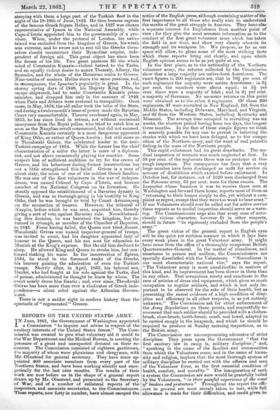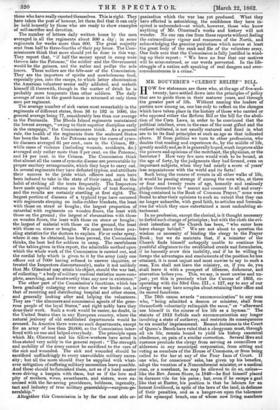REPORTS ON THE UNITED STATES ARMY.
TN June, 1861, the Government of Washington appointed a Commission " to inquire and advise in respect of the sanitary interests of the United States forces." The Com- mission was created to give what voluntary aid it could to the War Department and the Medical Bureau, in meeting the pressure of a great and unexpected demand on their re- sources. The Commission consisted of eighteen gentlemen, the majority of whom were physicians and clergymen, with Mr. Olmstead for general secretary. They have since ap- pointed 400 associate members from every part of the Northern States, and have been working silently and ener- getically for the last nine months. The results of their work are now before us in the shape of a general report drawn up by Mr. Olmstead, and presented to the Secretary of War, and of a number of collateral reports of the inspectors, and associate secretaries, to the Commissioners. These reports, now forty in number, have almost escaped the notice of the English press, although containing matter of the first importance to all those who really. wish to understand the merits of the great struggle in America. They have also a separate interest for Englishmen from another point of view ; for they give the most accurate information as to the conduct of the first great volunteer army which has taken the field in our time, and show very clearly wherein its strength and its weakness lie. We propose, as far as our space will allow, to glean some of the most striking facts which these reports bring out clearly, and upon which English opinion seems to be as yet quite at sea.
In the first place, as to the nationality of the Northern volunteer army, the returns collected by the Commission show that a large majority are native-born Americans. The exact figures in 200 regiments are, that in 76 per cent. of such regiments the majority were native Americans ; in 5-i per cent. the numbers were about equal ; in 5+ per cent. there were a majority of Irish ; and in 6. per cent. a majority of Germans. No accurate returns on this point were obtained as to the other 6 regiments. Of these 200 regiments, 37 were recruited in New England, 101 from the Middle States, including Delaware, Maryland, and Virginia, and 62 from the Western States, including Kentucky and Missouri. The average time occupied in recruiting was six weeks, the shortest period having been ten days, the longest three months. In the face of these simple figures we think it scarcely possible for any one to persist in believing the stories with which we have been deluged, as to the compo- sition of the Northern army, and the want of real patriotic feeling in the mass of the Northern people. This rapid enlistment had its great drawbacks. The me- dical inspection of recruits was much neglected at first. In 58 per cent. of the regiments there was no pretence at tho- rough inspection. The consequence has been that a very large number have been discharged as unfit for service on account of disabilities which existed before enlistment. In October last, for instance, out of 1620 men discharged from the Potomac army, 53 per cent. were for these causes. The Inspector whose business it was to receive these men at Washington and forward them home, reports most of them as "returning to their homes simply to die, yet without a com- plaint or regret, except that they were too weak to bear arms." If our Volunteers should ever be called out for active service these reports as to medial inspection should serve as a warn- ing. The Commissioners urge also that every man of noto- riously vicious character, however fit in other respects, should in future " be rigorously excluded from the people's army." The great virtue of the general report in English eyes will be the quiet yet ruthless manner in which it lays bare every weak place in the great Volunteer army. It might have come from the office of a thoroughly competent British Quartermaster-General. In the matter of cleanliness, and smartness in person and uniform, the Commissioners are specially dissatisfied with the Volunteers. " Slovenliness is our most characteristic national vice," says the report. " The Volunteer army is more unsoldierlike in matters of this kind, and its improvement has been slower in them than in any other. That scrupulous nicety and exactness in the care of articles of dress and equipment, which gives so much occupation to regular soldiers, and which is not only im- portant to be observed for the sake of their health, but as presenting the surest evidence of a high condition of disci- pline and efficiency in all other respects, is as yet entirely unknown." The Commission ask for strict enforcement of the Army Regulations on these points, and respectfully re- commend that each soldier should be provided with a clothes- brush, shoe-brush, tooth-brush, comb, and towel, adapted to be carried snugly in the knapsack, and which he should be required to produce at Sunday morning inspections, as in the British army. The Commission are uncompromising advocates of strict discipline. They press upon the Government " that the first sanitary law in camp is, military discipline ;" and, " speaking in the name of the families and communities from which the Volunteers come, and in the name of huma- nity and religion, implore that the most thorough system of military discipline be carried out with the officers and men of the Volunteer force, as the first essential condition of health, comfort, and morality." The inauguration of such a system the Commission are sure would be gratefully hailed by the Volunteers, " in their painful experience of the want of leaders and protectors." Throughout the report the offi- cers in general are most sternly taken to task, while full allowance is made for their difficulties, and credit given to those who have really exerted themselves. This is right. They have taken the post of honour, let them feel that it can only be held honestly by those who are ready to show examples of self.sacrifice and devotion.
The number of letters daily written home by the men averaged in all the regiments about 300 a day ; in some regiments for weeks more than 600. The great majority sent from half to three-fourths of their pay home. The Com- missioners think that more should yet be done in this way. They report that, "if half the money spent in camp were thrown into the Potomac," the soldier and the Government would be the gainers, and the sutler and pedlar the sole losers. These sutlers are the bite-noir of the Commission. They are the importers of spirits and unwholesome food, especially pies, into the camps, to which latter abomination the American volunteer seems sadly addicted, and maketh himself ill therewith, though in the matter of drink he is probably more temperate than other soldiers. The daily average of men in the guard-house is returned at only three men per regiment.
The average number of sick varies most remarkably in the regiments of different states, from 36 to 192 in 1000, the general average being 77, considerably less than our average in the Peninsula. The Rhode Island regiments maintained the lowest average, "owing to their superior discipline early in the campaign," the Commissioners think. As a general rule, the health of the regiments from the seaboard States has been the best. In the Potomac army the cases of zymo- tic diseases averaged 61 per cent., ours in the Crimea, 69 ; while cases of violence (including wounds, accidents, &c.) averaged only rather more than 3 per cent. on the Potomac, and 14 per cent. in the Crimea. The Commission think that almost all the cases of zymotic disease are preventable by proper sanitary arrangements, which they hope to carry out. In several regiments they have defeated typhus, and attribute their success to the pride which officers and men have been induced to take in the state of their camp, and to the habit of striking all the tents frequently. The Inspectors have made special returns on the subject of tent flooring, and the results are certainly startling at first sight. The largest portion of diseases of a typhoid type have occurred with regiments sleeping on india-rubber blankets, the least with those on straw or boughs ; the largest proportion of catarrhal with regiments on wooden floors, the least with those on the ground ; the largest of rheumatism with those on wooden floors, the least with those on straw or boughs ; the largest of malarial with those on the ground, the least with those on straw or boughs. We must leave these puz- zling statistics for the doctors to explain. Fir or cedar spray, where it can be obtained, has been proved, the Commission thinks, the best bed for soldiers in camp. The carefulness of the tables given in this report, the admirable method upon which the whole work of the Commission is carried out, and the cordial help which is given to it by the army (only one officer out of 7000 having refused to answer inquiries, or treated the Inspectors discourteously), make it not unlikely that Mr. Olmstead may attain his object, should the war last, of collecting " a body of military medical statistics more com- plete, searching, and trustworthy than any now in existence." The other part of the Commission's functions, which has been gradually enlarging ever since the war broke out, is that of receiving and distributing hospital and other stores, and generally looking after and helping the volunteers. They are " the almoners and commission agents of the gene- rous people of the loyal States," and right nobly have they done their work. Such a work would be easier, no doubt, in the United States than in any European country, where the natural jealousy of old established departments would be aroused. In America there were no such departments, except for an army of lees than 20,000, so the Commission inter- fered with no one and helped everybody. The principle upon which Mr. Olmstead and his fellow-workers have acted is thus stated very nobly in the general report : " The strength and mobility of the army cannot be sacrificed to the care of the sick and wounded. The sick and wounded should be sacrificed unflinchingly to every unavoidable military neces- sity; but all the more should they be supplied with what- ever mitigation of suffering military necessities leave possible. And these should be furnished them, not as if a hard master were driving a bargain with them, but as if the love and pity of mothers, wives, sweethearts, and sisters, were ex- ercised with the far-seeing providence, boldness, ingenuity, tact and industry of true military generalship—surgeon-ge- neralship."
Altogether this Commission is by far the most able or- ganization which the war has yet produced. What they have effected is astonishing, the confidence they have in- spired is unbounded—at which, however, those who know anything of Mr. Olmstead's works and history will not wonder. No one can rise from these reports without feeling the extraordinary vigour and resources of the North, and acknowledging the genuine patriotism which moves at least the great body of the rank and file of the volunteer army. One feels sure that the Commission is fully justified in wind- ing up their report : " We have no fear that our motives will be misconstrued, or our words perverted. In the life- struggle of a nation soft speaking of real dangers and over- considerateness is a crime."































 Previous page
Previous page